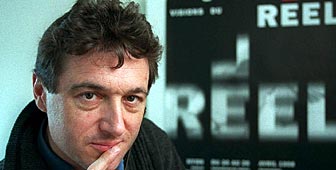“Gambling, Gods and LSD” sweeps up Nyon prize

The Swiss-Canadian director, Peter Mettler, has won the Grand Prix of the Nyon international film festival for his epic documentary, "Gambling, Gods and LSD".
Mettler’s film, which was seven years in the making, is an exploration of our need for optimism and happiness. It also won the prize in the young viewers’ category.
The Swiss director Ursula Meier also carried off a prize during Saturday’s award ceremony for her documentary about a Geneva policeman, who went from being a right-wing extremist to mediator for minorities in Switzerland.
Festival evolution
The festival may have dropped the word “documentary” from its title, but its director, Jean Perret, says this year’s films show the genre is alive and well.
Nyon has hosted the “Visions du Réel” (Visions of reality) documentary festival for 34 years, and Perret thought it was high time for a new name to reflect the stylistic and technical changes in documentary filmmaking.
“We show more than news-type documentaries now,” Perret told swissinfo. “There are many ways of describing a documentary, so the word as such doesn’t suffice to contain all the different expressions of independent filmmaking.
“This is because a documentary contains a very specific, personal point of view. It is always a vision that is filmed – a large, complex vision of reality.”
“Superficial”
For Perret, documentaries have been moving ever further away from the mainstream media, which is obsessively preoccupied with the here and now. “Daily news is superficial,” he said. “But documentaries delve into the complexity of the world.”
Reflecting this complexity were over 100 films screened at Nyon this week. Contributions came from China, Belgium and Finland, as well as a series of 30 South African films about Aids. Among the highlights were films by documentary filmmakers Frederick Wiseman and Donigan Cumming.
Among the Swiss films presented was Christian Frei’s “War Photographer”, nominated at this year’s Oscars.
For Perret, Switzerland’s strong presence in the documentary world has a lot to do with generous funding from the state. “We have a strong tradition here, with public funding readily available. There would be none of this without a strong policy in favour of movie making.”
Buying time
Apart from cash, this funding gives filmmakers one of the most important things needed to produce quality documentaries – time.
“Time is needed to develop the subject, for analysis, for meeting with people, to understand situations,” said Perret. “Documentary makers need months, sometimes years to shoot, edit and present their films, so time is the first quality needed for this kind of filmmaking.
“In some ways, it is the opposite of daily news,” he continued. “News has to be quick and short, but that’s the deal.
“A documentary is a story, and it needs to be a good one. In Switzerland, as in other European countries, we have the ability to tell real, arresting, stories.”
Technical revolution
Documentary filmmaking hasn’t only moved away from mainstream media because of time constraints. Technical evolution has brought about major changes, too, with the arrival of digital video in the past decade, and more portable cameras.
“These cameras are very important in countries where you have no money for documentaries,” said Perret. “For example, in China, you have the next wave of filmmakers working with DV cameras and showing incredible stories. These new techniques have allowed a new generation of filmmakers to invent or discover stories.”
The stories being told have also become more personal. “Many of these stories are often related to private lives. People have begun filming their own lives because of these cameras.”
Reality TV
But is there are danger that documentary films are becoming like so-called “reality TV”? In Perret’s view, a window on family life has the potential to make an excellent documentary, provided it has a wider relevance.
“We are interested in family stories, but only those that concern a larger audience – stories with universal meaning.”
The new technology is no guarantee of quality either. “We have seen a lot of bad films,” said Perret. “Video cameras are a very good thing, but they are of no value to people who don’t have a point of view, and you need a point of view if you want to film something.”
A festival like Nyon showcases film talent well before the mainstream media takes notice, and its organisers spending much of their time casting around for hidden jewels.
“You can always find new stories, new people,” said Perret. “It’s a chance to discover new landscapes before the others do.”
Documentaries also have another big advantage – namely their originality. “Many fiction films often just tell the same story over and over again,” Perret told swissinfo. “But we need to believe in true stories, in what we’re looking at.
“Festivals like Cannes, Venice or Berlin need strong films to beef up their line-up and they are adding documentaries to their programming. Nowadays, a good documentary is also a good film, and that’s what we want to show in Nyon.”
by Scott Capper

In compliance with the JTI standards
More: SWI swissinfo.ch certified by the Journalism Trust Initiative








You can find an overview of ongoing debates with our journalists here . Please join us!
If you want to start a conversation about a topic raised in this article or want to report factual errors, email us at english@swissinfo.ch.